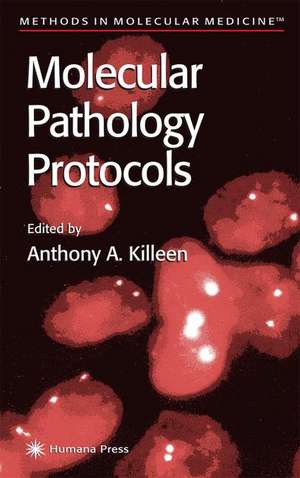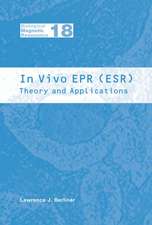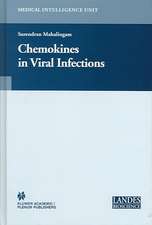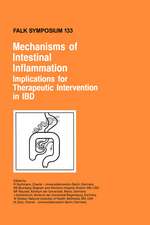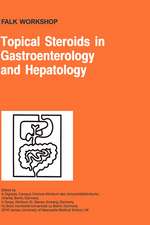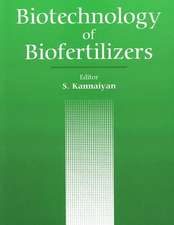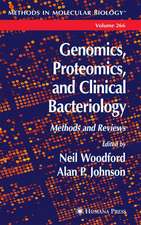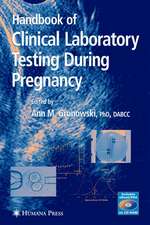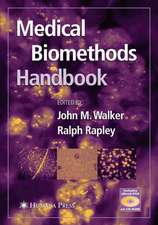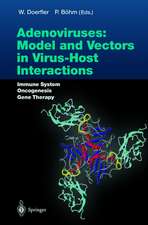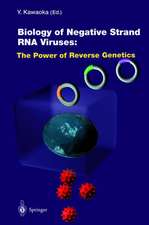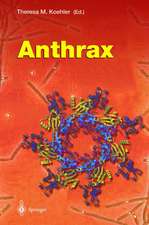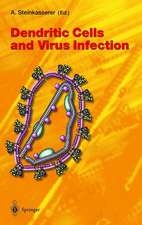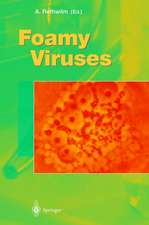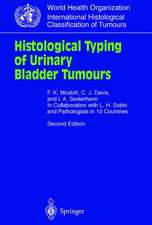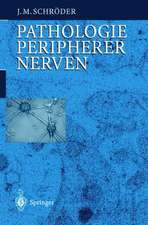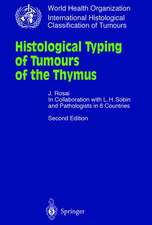Molecular Pathology Protocols: Methods in Molecular Medicine, cartea 49
Editat de Anthony A. Killeenen Limba Engleză Hardback – 22 sep 2000
| Toate formatele și edițiile | Preț | Express |
|---|---|---|
| Paperback (1) | 790.17 lei 6-8 săpt. | |
| Humana Press Inc. – 9 noi 2010 | 790.17 lei 6-8 săpt. | |
| Hardback (1) | 1119.84 lei 6-8 săpt. | |
| Humana Press Inc. – 22 sep 2000 | 1119.84 lei 6-8 săpt. |
Din seria Methods in Molecular Medicine
- 5%
 Preț: 1278.74 lei
Preț: 1278.74 lei - 15%
 Preț: 655.78 lei
Preț: 655.78 lei - 5%
 Preț: 1106.50 lei
Preț: 1106.50 lei - 5%
 Preț: 727.44 lei
Preț: 727.44 lei - 5%
 Preț: 1108.72 lei
Preț: 1108.72 lei - 15%
 Preț: 650.55 lei
Preț: 650.55 lei - 5%
 Preț: 735.66 lei
Preț: 735.66 lei - 18%
 Preț: 947.35 lei
Preț: 947.35 lei - 18%
 Preț: 948.92 lei
Preț: 948.92 lei - 5%
 Preț: 1114.54 lei
Preț: 1114.54 lei - 5%
 Preț: 1114.91 lei
Preț: 1114.91 lei - 15%
 Preț: 658.55 lei
Preț: 658.55 lei - 5%
 Preț: 734.01 lei
Preț: 734.01 lei - 5%
 Preț: 1111.61 lei
Preț: 1111.61 lei - 5%
 Preț: 1104.32 lei
Preț: 1104.32 lei - 5%
 Preț: 723.21 lei
Preț: 723.21 lei - 5%
 Preț: 1106.13 lei
Preț: 1106.13 lei - 5%
 Preț: 723.05 lei
Preț: 723.05 lei - 5%
 Preț: 1108.35 lei
Preț: 1108.35 lei - 5%
 Preț: 723.42 lei
Preț: 723.42 lei - 5%
 Preț: 1115.65 lei
Preț: 1115.65 lei - 5%
 Preț: 786.86 lei
Preț: 786.86 lei - 5%
 Preț: 1133.01 lei
Preț: 1133.01 lei - 5%
 Preț: 1114.71 lei
Preț: 1114.71 lei
Preț: 1119.84 lei
Preț vechi: 1178.77 lei
-5% Nou
Puncte Express: 1680
Preț estimativ în valută:
214.27€ • 223.74$ • 176.94£
214.27€ • 223.74$ • 176.94£
Carte tipărită la comandă
Livrare economică 15-29 aprilie
Preluare comenzi: 021 569.72.76
Specificații
ISBN-13: 9780896036819
ISBN-10: 0896036812
Pagini: 491
Ilustrații: XIV, 491 p.
Dimensiuni: 155 x 235 x 33 mm
Greutate: 1.05 kg
Ediția:2001
Editura: Humana Press Inc.
Colecția Humana
Seria Methods in Molecular Medicine
Locul publicării:Totowa, NJ, United States
ISBN-10: 0896036812
Pagini: 491
Ilustrații: XIV, 491 p.
Dimensiuni: 155 x 235 x 33 mm
Greutate: 1.05 kg
Ediția:2001
Editura: Humana Press Inc.
Colecția Humana
Seria Methods in Molecular Medicine
Locul publicării:Totowa, NJ, United States
Public țintă
Professional/practitionerCuprins
DNA Extraction from Paraffin-Embedded Tissues.- DNA Extraction from Fresh or Frozen Tissues.- RNA Extraction from Fresh or Frozen Tissues.- Single-Strand Conformation Polymorphism Analysis of Mutations in Exons 4-8 of the TP53 Gene.- Cleavase® Fragment Length Polymorphism Analysis for Genotyping and Mutation Detection.- Detection of Telomerase by In Situ Hybridization and by the Polymerase Chain Reaction-Based Telomerase Activity Assay.- Detection of Microsatellite Instability.- Polymerase Chain Reaction Clonality Assays Based on X-Linked Genes.- Fluorescent In Situ Hybridization.- HER-2/neu Oncogene Amplification Determined by Fluorescence In Situ Hybridization.- A Nested Reverse Transcription-Polymerase Chain Reaction Assay to Detect BCR/abl.- Detection of t(15;17)(q24;q21), inv(16)/t(16;16)(p13;q22), and t(8;21)(q22;q22) Anomalies in Acute Myeloid Leukemias.- Detection of t(14; 18)(q32;q21)-Associated BCL-2/JH Gene Fusion in Non-Hodgkin Lymphoma.- Detection of Breast Cancer Cells Using Immunomagnetic Beads and Reverse Transcriptase Polymerase Chain Reaction.- Molecular Detection of Circulating Prostate Cancer Cells.- Methods to Detect Clonal Gene Rearrangements in Lymphomas and Leukemias.- Monitoring of Bone Marrow Transplant Engraftment.- Direct Molecular Diagnosis of Multiple Endocrine Neoplasia Type 1.- Molecular Detection of Multiple Endocrine Neoplasia Type 2.- Assay for Detecting the I1307K Susceptibility Allele within the Adenomatous Polyposis ColiGene.- Detection of Human Papillomaviruses by Polymerase Chain Reaction and In Situ Hybridization.- Molecular Methods for Detecting Epstein-Barr Virus (Part I).- Molecular Methods for Detecting Epstein-Barr Virus (Part II).- Molecular Methods for Detecting Epstein-Barr Virus (Part III).- Molecular Detection ofKaposi’s Sarcoma-Associated Herpesvirus/ Human Herpesvirus-8.- Diagnostic Applications of Quantitative Polymerase Chain Reaction for Cytomegalovirus.- A Colorimetric Microtiter Plate Polymerase Chain Reaction System That Detects Herpes Simplex Virus in Cerebrospinal Fluid and Discriminates Genotypes 1 and 2.- Detection and Typing of Hepatitis C Virus.- Detection and Speciation of Mycobacteria in Formalin-Fixed, Paraffin-Embedded Tissue Sections.- Ultrasensitive Quantitation of Human Immunodeficiency Virus Type 1 RNA in Plasma by the AMPLICOR and COBAS AMPLICOR HIV-1 MONITOR™ Tests.- Molecular Diagnosis of Hereditary Thrombotic Disorders.- Prenatal Genotyping of the RhD Locus to Identify Fetuses at Risk for Hemolytic Disease of the Newborn.- Molecular Diagnosis of Hereditary Hemochromatosis.- Genotyping of Apolipoprotein E.- Genotyping for Functionally Important Human CYP2D6*4 (B) Mutation Using TaqMan Probes.
Recenzii
"It contains cutting-edge molecular diagnostic techniques with detailed step-by-step instructions and tips to obtain successful results....the purpose here is to offer readily reproducible molecular pathology techniques that are either frequently performed or recognized for their significant diagnostic utility. It is a worthy objective and the editor meets it very well....Certain methodological details are described in the notes, which provide much helpful information in methodology and tips on how to avoid pitfalls. This form of presentation is attractive both to newcomers to the field and to those with some experience in diagnostic molecular pathology....Cutting-edge methods include telomerase, microsatellite instability, chromosomal translocations, and fluorescent in situ hybridization assays....The significant diagnostic utility of molecular protocols in cancer, hermatological malignancies, and virus related diseases is covered well....It is a good protocol resource book in molecular pathology."-Doody's Health Sciences Book Review Journal
"Molecular Pathology Protocols fills a unique niche for general molecular pathology laboratories that may be called upon to perform a wide variety of tests for infectious and noninfectious diseases. It has 35 chapters that provide extensive detail on laboratory protocols for a variety of important conditions, from techniques for preparation of nucleic acid templates and mutation detection for genetic and neoplastic evaluations, to hematological applications, to a limited number of detailed protocols for infectious disease diagnosis and monitoring...The major strength of the protocols discussed in this book lies in their enormous detail and the practical remarks of the authors, which will assist in establishing the assays in a new laboratory. Another great value in some chapters is the emphasis on the assessment of quality control that will meet or exceed all the requirements of agencies that license and regulate clinical laboratories." - Clinical Infectious Diseases
"A must for genetic laboratories and all those using the new molecular biological methods." - Journal of Endocrine Genetics
"Each protocol in this book includes sections of introduction, materials, methods, and notes. Certain methodological details are described in the notes, which provide much helpful information in methodology and tips on how to avoid pitfalls. This form of presentation is attractive both to newcomers to the field and to those with some experience in diagnostic molecular pathology. Most protocols use polymerase chain reaction (PCR) based techniques. Cutting-edge methods include telomerase, microsatellite instability, chromosomal translocations, and fluorescent in sity hybridization assays. This book has good references in both background of diseases and techniques. Most charts and labels have high quality;...The significant diagnostic utility of molecular protocols in cancer, hematological malignancies, and virus related diseases is covered well....This book is well written and the molecular protocols introduced can be easily followed practically." - E-Streams
"Molecular Pathology Protocols fills a unique niche for general molecular pathology laboratories that may be called upon to perform a wide variety of tests for infectious and noninfectious diseases. It has 35 chapters that provide extensive detail on laboratory protocols for a variety of important conditions, from techniques for preparation of nucleic acid templates and mutation detection for genetic and neoplastic evaluations, to hematological applications, to a limited number of detailed protocols for infectious disease diagnosis and monitoring...The major strength of the protocols discussed in this book lies in their enormous detail and the practical remarks of the authors, which will assist in establishing the assays in a new laboratory. Another great value in some chapters is the emphasis on the assessment of quality control that will meet or exceed all the requirements of agencies that license and regulate clinical laboratories." - Clinical Infectious Diseases
"A must for genetic laboratories and all those using the new molecular biological methods." - Journal of Endocrine Genetics
"Each protocol in this book includes sections of introduction, materials, methods, and notes. Certain methodological details are described in the notes, which provide much helpful information in methodology and tips on how to avoid pitfalls. This form of presentation is attractive both to newcomers to the field and to those with some experience in diagnostic molecular pathology. Most protocols use polymerase chain reaction (PCR) based techniques. Cutting-edge methods include telomerase, microsatellite instability, chromosomal translocations, and fluorescent in sity hybridization assays. This book has good references in both background of diseases and techniques. Most charts and labels have high quality;...The significant diagnostic utility of molecular protocols in cancer, hematological malignancies, and virus related diseases is covered well....This book is well written and the molecular protocols introduced can be easily followed practically." - E-Streams
Textul de pe ultima copertă
Because molecular pathology has only recently emerged from the laboratory, many molecular pathology protocols are still to be found only in the primary literature. In Molecular Pathology Protocols, Anthony Killeen has assembled a collection of readily reproducible molecular pathology techniques that are either frequently performed or recognized for their significant diagnostic utility. Each method is described in step-by-step detail by a leading molecular pathologist or laboratory scientist who has developed it or used it extensively. These clinical laboratory techniques can be used for the diagnosis or monitoring of cancer, hematological malignancies, infectious diseases, and selected genetic disorders. Cutting-edge methods include telomerase, microsatellite instability, chromosomal translocations, and fluorescent in situ hybridization assays. Time-tested practices and numerous tips on how to avoid pitfalls ensure robust and successful results.
Comprehensive and path-breaking, Molecular Pathology Protocols will enable clinical laboratories to introduce new molecular pathology tests and lay the groundwork for a much-needed standardization in this rapidly developing field.
Comprehensive and path-breaking, Molecular Pathology Protocols will enable clinical laboratories to introduce new molecular pathology tests and lay the groundwork for a much-needed standardization in this rapidly developing field.
Caracteristici
Includes supplementary material: sn.pub/extras
